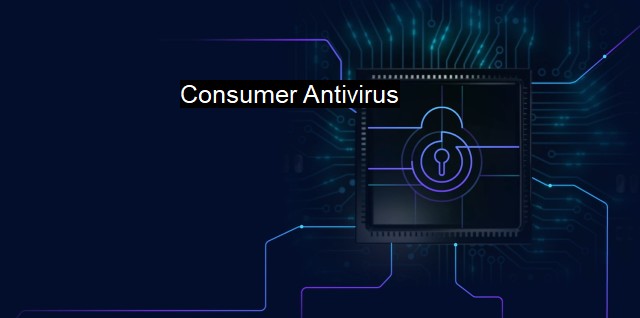What are Consumer Antivirus?
The Definition and Features of Consumer Antivirus in Today's Cybersecurity Landscape
First and foremost, "Consumer Antivirus" refers to a particular type of software designed specifically to safeguard personal computers, smartphones, and other devices utilized by individuals as opposed to corporate or enterprise users. Antivirus software protects the device's software and hardware components from being damaged or affected by a myriad of viruses and threats operating on the internet, such as malware, spyware, ransomware, or even phishing attacks.The essentiality of consumer antivirus software revolves around the evolving nature of cyber threats that can pose severe harm to a consumer's online safety, data privacy, financial security, and overall cyber world experience. Even though enterprises generally have much greater resources and therefore are often the primary targets, individual consumers can also be soft targets and sometimes may be even more susceptible to cyber-attacks due to their relative nonchalance or lack of knowledge about cybersecurity measures.
Consumer antivirus software provides an important layer of protection against these threats. It operates by scanning, detecting and eliminating viruses from the user's device. The software not only searches for known viruses using a library of defined malware signatures but also monitors the computer's behavior to identify suspicious activities. This technique helps in recognizing new or 'zero-day' threats that have not been formally identified yet.
This software is frequently updated to identify more recent threats and to counteract new strategies used by cybercriminals. Some antivirus software even provides real-time protection, continuously checking files, websites, and emails to detect threats as soon as they appear. Many consumer antivirus programs also provide firewall protection, adding an extra layer of defense against unauthorized access from outside your network.
A particularly valuable feature often found in consumer antivirus software is the Malware removal tool. This tool is designed to remove harmful software that has already infiltrated the user's device, reducing its potential impacts. Other valuable features may include email scanning to guard against phishing attempts, typically in the form of fraudulent emails that may look legitimate but are really intended to steal personal information. Insurance against identity theft is also offered in some consumer antivirus software packages.
Consumer antivirus software effectiveness may vary considerably. This could potentially be due to the varying methods they use to identify and remove threats, though even the best antivirus software might not always detect or stop every threat. Thus, it's worthwhile to recall that no antivirus can provide absolute protection, and it merely serves to strengthen a system's resilience against potential threats.
Interestingly, user behavior significantly shapes antivirus software's efficacy. Regular updates with the latest patches, safe-browsing habits, cautiousness while downloading and opening unidentified files or links, applying due discretion sharing personal information- these are all beneficial habits that need to be adopted alongside utilizing antivirus software.
Consumer antivirus is a vital tool in maintaining personal internet safety and data security. consumers must also actively involve themselves in upkeeping their cybersecurity by fostering safe internet practices and staying cautious when encountering suspicious online activities. Digital security requires a conglomerate of wise utilization of tools and exercises of discretion on part of consumers to remain cyber-secure.

Consumer Antivirus FAQs
What is a consumer antivirus?
A consumer antivirus is a type of software that is designed to protect individual users' devices, such as computers, smartphones, and tablets, from various forms of cyber threats. It provides real-time protection by regularly scanning the device's files and incoming data for any malicious code, such as viruses, spyware, and ransomware.How does a consumer antivirus work?
A consumer antivirus works by using a combination of signature-based detection and behavior-based detection techniques. In signature-based detection, the antivirus compares the file or data being accessed to a database of known malware signatures. If it matches, the antivirus blocks or removes the file. In behavior-based detection, the antivirus monitors the device's activity and looks for suspicious behaviors, such as attempts to modify system files or access sensitive data. If it detects such behavior, it may prompt the user for further action or take corrective measures on its own.What are the features of a good consumer antivirus?
A good consumer antivirus should have the following features: 1. Real-time protection against various forms of malware 2. Regular updates to its malware signature database 3. Behavior-based detection and intrusion prevention 4. Firewall protection to block unauthorized network traffic 5. Anti-phishing and anti-spam filters 6. Parental control features to set restrictions on children's access to online content 7. System optimization tools to improve device performance 8. Easy-to-use interface and user-friendly design 9. Multi-platform compatibility to protect different devicesDo I still need a consumer antivirus if I am careful online?
Yes, having a consumer antivirus is still important even if you are careful online. While being cautious about the websites you visit, emails you open, and files you download can reduce your risk of malware infections, no method is foolproof. Malware attacks can come from various sources, including legitimate websites that have been compromised or from infected files shared by friends or colleagues. A consumer antivirus provides an additional layer of protection that can prevent you from falling victim to such attacks.| | A | | | B | | | C | | | D | | | E | | | F | | | G | | | H | | | I | | | J | | | K | | | L | | | M | |
| | N | | | O | | | P | | | Q | | | R | | | S | | | T | | | U | | | V | | | W | | | X | | | Y | | | Z | |
| | 1 | | | 2 | | | 3 | | | 4 | | | 7 | | | 8 | | |||||||